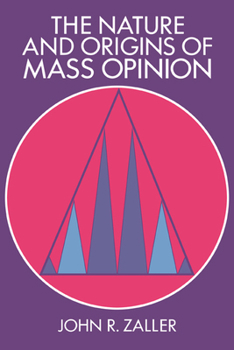The Nature and Origins of Mass Opinion
(Part of the Cambridge Studies in Public Opinion and Political Psychology Series)
Select Format
Select Condition 
Book Overview
In this 1992 book John Zaller develops a comprehensive theory to explain how people acquire political information from elites and the mass media and convert it into political preferences. Using... This description may be from another edition of this product.
Format:Paperback
Language:English
ISBN:0521407869
ISBN13:9780521407861
Release Date:August 1992
Publisher:Cambridge University Press
Length:382 Pages
Weight:1.20 lbs.
Dimensions:1.2" x 6.0" x 8.9"
Customer Reviews
5 ratings
A very informatinve book!
Published by Thriftbooks.com User , 16 years ago
I had to read this book for a class at school and its very well written. This book is very informative and a recommend reading.
A REVIEW I WROTE FOR SCHOOL . . .
Published by Thriftbooks.com User , 18 years ago
An interesting, and occasionally vexing, topic of study in political science is public opinion. In his book The American Democracy Thomas Patterson touches upon myriad issues that surround this topic: the difficulties in accurately measuring public opinion, the inconsistencies and fluidity of public opinion, and political socialization are just a few of the factors of interest to political scientists that Patterson examines. However, no introductory text can examine such a multifaceted topic in great depth, and as a result on page two-hundred eleven of his book Patterson recommends John R. Zaller's The Nature and Origins of Mass Opinion as a good source for more in-depth information about public opinion formation and measurement. Indeed, Patterson characterizes Zaller's work as "[a] superb analysis of the nature of public opinion" (211). Zaller examines many, if not all, of the factors that influence public opinion, spending a great deal of time examining the affect of information on political opinions and election choices, and the impact of "elite domination of public opinion" (310). But Zaller's work is perhaps best known for its thoughtful examination of public opinion instability, an examination that challenges traditional thinking on the topic. And, while not perfect, it is easily one of the most important and influential works written on this subject. As Zaller highlights, variances in survey results has traditionally been attributed to "measurement error" which is built into a survey or the presence of "nonattitudes" (i.e. respondents answer questions about which they have no strong opinion) (31). In the broadest sense, The Nature and Origins of Mass Opinion strives to refute these explanations; and instead posits that a combination of factors, including the degree of ambivalence an individual has related to a specific topic, the general level of interest a person has in a topic, and what information has been encountered and how recently, more accurately explain response instability. Zaller does an excellent job of building his case for this perspective; in particular the use of literature from disciplines other than political science is especially compelling. Supported by this literature, and compelling in its own right, are the axioms that comprise his "Receive-Accept-Sample (RAS) model" (58). The author painstakingly examines each of his axioms and examines each in relationship to real world data which serves to further strengthen his arguments. As a result it seems clear that his contentions that individuals who are more aware of the political process are also more likely to perceive political messages, while at the same time resisting messages that run counter to their own political biases, have great validity. Further, Zaller's argument that there is a high degree of ambivalence on many issues is well supported by the analysis of the findings from the 1987 pilot study that is cited (63). Finally, even though the auth
A must read for Political scientists
Published by Thriftbooks.com User , 19 years ago
Zaller's argues public opinion on issues is unreliable, primarily because elite sources of information provide competing or multiple considerations causing public opinon polls to measure whatever recent elite message an individual has stored in thier short term memory. A classic and important text. Zaller is not a straightforeward read, but lays out an important theory. The theory lacks focus on the use of core values and partisanship on public opinion; two important variables. Other than that it has held up to criticism for over a decade
Useful but dense
Published by Thriftbooks.com User , 19 years ago
Zaller's book presents an interesting elite-driven model of public opinion, which essentially concludes that opinion polls are less than reliable and we should be skeptical of attempts to measure the public's attitudes. However, it is very dense, is chock-full of advanced statistics above the head of most political science graduate students, and therefore at the end of the day is somewhat unsatisfying.If you need a primer on public opinion research, this isn't it. But if you want to read cutting-edge work, and you have a good grasp of statistics, dive in.
A Modern PoliSci Classic
Published by Thriftbooks.com User , 23 years ago
What would a comprehensive graduate exam in political science or political behavior be without a review of Zaller's now classic text? Elite discourse, Zaller informs us, shapes public opinion. That is, powerholders have the ability to mold both the agenda of the public -- the political issues that citizens feel to be most important -- as well as their beliefs about these issues. The topic raises important normative and ethical issues and the book offers a number of starting points for follow-up research. A decidedly good, important buy, this one.





